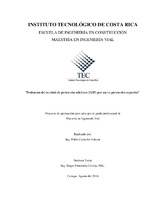Mostrar el registro sencillo del ítem
Evaluación del reciclado de pavimentos asfálticos (RAP) para uso en pavimentos expuestos
| dc.contributor.advisor | Fernández-Cerdas, Sergio | es |
| dc.contributor.author | Camacho-Salazar, Pablo | |
| dc.date.accessioned | 2017-09-20T20:33:41Z | |
| dc.date.available | 2017-09-20T20:33:41Z | |
| dc.date.issued | 2016 | |
| dc.identifier.uri | https://hdl.handle.net/2238/9127 | |
| dc.description | Proyecto de Graduación (Maestría en Ingeniería Vial) Instituto Técnologico de Costa Rica, Escuela de Ingeniería en Construcción, 2016 | es |
| dc.description.abstract | According to the Sectorial Planning Department of the Public Works and Transport Ministry (MOPT), it is estimated that in Costa Rica there are 26,966 km of unpaved road network commonly, in comparison with 9,142 km that are paved (either concrete or asphalt). By making a comparison in network length, the extension of this network significant, which means that it requires important proportions of materials for its conservation, reason why material optimization with alternate aggregates sources as the recycled materials, can help to optimize the use of virgin aggregate and in return saving maintenance costs. The durability of surface exposed roads depends on the physical and mechanical properties of the material, so there is a need to assess the condition of the material to conduct a proper pavement structure design. However, when this is not done, accelerated deterioration of the surface can be found, with the aggravating consequence that the granular material is usually the highest cost item within an exposed pavement road project. In Costa Rica, even though solutions have been accomplished by the intervention of such routes by placing Recycled Asphalt Pavement (RAP) result from the milling activity of asphalt layers in periodic maintenance projects, the use of this material has had compromised results since the design of thickness and placement have been made by empirical means without previous design. In this sense, this project evaluates the properties of RAP in the laboratory to determine its feasibility as a substitute and / or complement to virgin granular material layers for exposed base pavements. The evaluation of the physical-mechanical RAP properties in the laboratory was accomplished as well as the comparison between such properties and sources of virgin granular material commonly used on unpaved roads, which allowed to conclude that the RAP material and mixtures can be used as substitutes for virgin granular material for use in gravel roads. In addition, based on the determination of material properties, it was observed that there are significant differences in physic-mechanical properties among sources of RAP, giving the variability among the different sources. | es |
| dc.language.iso | spa | es |
| dc.publisher | Instituto Tecnológico de Costa Rica | es |
| dc.rights | acceso abierto | es |
| dc.subject | Caminos de lastres | es |
| dc.subject | Evaluación | es |
| dc.subject | RAP | es |
| dc.subject | Pavimento | es |
| dc.subject | Asfalto | es |
| dc.title | Evaluación del reciclado de pavimentos asfálticos (RAP) para uso en pavimentos expuestos | es |
| dc.type | tesis de maestría | es |


